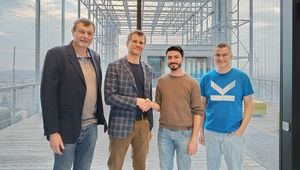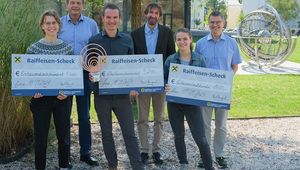Alexander Ebner Wins the 2020 Macke Award
This year's 2020 Wilhelm Macke Award goes to Alexander Ebner in recognition of his spectacular new spectroscopic analysis technique.

Alexander Ebner’s presentation titled "High Power Quantenkaskadenlaser – Wir beobachten Moleküle bei der Arbeit" won the audience – which simultaneously served as the jury – over. The Johannes Kepler University Linz presents annual awards in recognition of outstanding Master's theses in physics. In this case, the candidates must win the audiences’ popular vote. As always, the audience is made up of school students and the presentations are short, humorous, and presented in laymen’s terms. The audience was treated to an entertaining afternoon featuring presentations that gave insight into various areas of physics.
The Winner: Alexander Ebner, opens an external URL in a new window (Center for Surface and Nanoanalytics)
High Power Quantum Cascade Laser - Observing Molecules at Work
Alexander Ebner has succeeded in revolutionizing a versatile spectroscopic analysis technique by using quantum cascade lasers. The new method is 10,000 times brighter and 60,000 times faster than existing alternatives, paving the way for new fields of application in industry and for research.
Additional Finalists:
Franziska Maier, opens an external URL in a new window (Institute of Applied Physics)
On the Trail of the Atomic Nucleus – From the JKU to CERN
CERN is the world's largest research center in the field of particle physics. Franziska Maier placed an ion trap for exotic atomic nuclei at CERN and examined them more closely using a laser. Her presentation explains just how this works and why it is important to understand atomic nuclei.
Michael Ammann, opens an external URL in a new window (School of Education)
The Many Faces of Entropy - An Unraveling Game in 6 Acts
Entropy is an essential universal property and a reason why time has direction - and why a desk can become messier faster than it is tidy up. Explaining entropy, on the other hand, is not that easy. Michael Ammann put a lot of energy into the task of explaining energy, preserving it, and the state of disorder in a way the school students can understand.
About Alexander Ebner
Alexander Ebner (29) lives in Bad Zell and enjoys playing ice-hockey, guitar, and traveling to far-away lands.
News

 Go to JKU Homepage
Go to JKU Homepage











